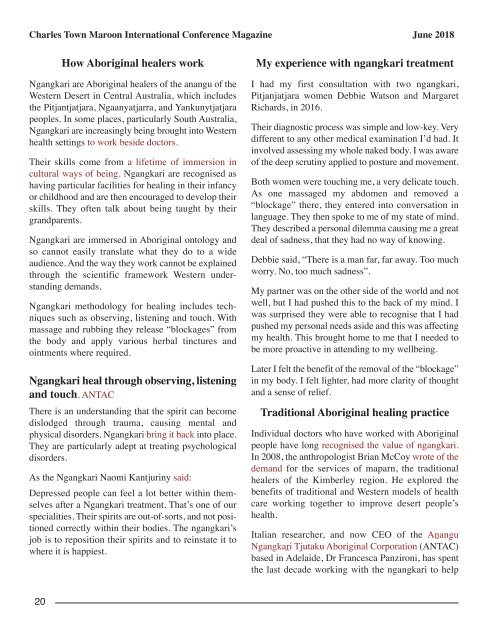Maroon Magazine 2018_266
You also want an ePaper? Increase the reach of your titles
YUMPU automatically turns print PDFs into web optimized ePapers that Google loves.
Charles Town <strong>Maroon</strong> International Conference <strong>Magazine</strong> June <strong>2018</strong><br />
How Aboriginal healers work<br />
Ngangkari are Aboriginal healers of the anangu of the<br />
Western Desert in Central Australia, which includes<br />
the Pitjantjatjara, Ngaanyatjarra, and Yankunytjatjara<br />
peoples. In some places, particularly South Australia,<br />
Ngangkari are increasingly being brought into Western<br />
health settings to work beside doctors.<br />
Their skills come from a lifetime of immersion in<br />
cultural ways of being. Ngangkari are recognised as<br />
having particular facilities for healing in their infancy<br />
or childhood and are then encouraged to develop their<br />
skills. They often talk about being taught by their<br />
grandparents.<br />
Ngangkari are immersed in Aboriginal ontology and<br />
so cannot easily translate what they do to a wide<br />
audience. And the way they work cannot be explained<br />
through the scientific framework Western understanding<br />
demands.<br />
Ngangkari methodology for healing includes techniques<br />
such as observing, listening and touch. With<br />
massage and rubbing they release “blockages” from<br />
the body and apply various herbal tinctures and<br />
ointments where required.<br />
Ngangkari heal through observing, listening<br />
and touch. ANTAC<br />
There is an understanding that the spirit can become<br />
dislodged through trauma, causing mental and<br />
physical disorders. Ngangkari bring it back into place.<br />
They are particularly adept at treating psychological<br />
disorders.<br />
As the Ngangkari Naomi Kantjuriny said:<br />
Depressed people can feel a lot better within themselves<br />
after a Ngangkari treatment. That’s one of our<br />
specialities. Their spirits are out-of-sorts, and not positioned<br />
correctly within their bodies. The ngangkari’s<br />
job is to reposition their spirits and to reinstate it to<br />
where it is happiest.<br />
My experience with ngangkari treatment<br />
I had my first consultation with two ngangkari,<br />
Pitjanjatjara women Debbie Watson and Margaret<br />
Richards, in 2016.<br />
Their diagnostic process was simple and low-key. Very<br />
different to any other medical examination I’d had. It<br />
involved assessing my whole naked body. I was aware<br />
of the deep scrutiny applied to posture and movement.<br />
Both women were touching me, a very delicate touch.<br />
As one massaged my abdomen and removed a<br />
“blockage” there, they entered into conversation in<br />
language. They then spoke to me of my state of mind.<br />
They described a personal dilemma causing me a great<br />
deal of sadness, that they had no way of knowing.<br />
Debbie said, “There is a man far, far away. Too much<br />
worry. No, too much sadness”.<br />
My partner was on the other side of the world and not<br />
well, but I had pushed this to the back of my mind. I<br />
was surprised they were able to recognise that I had<br />
pushed my personal needs aside and this was affecting<br />
my health. This brought home to me that I needed to<br />
be more proactive in attending to my wellbeing.<br />
Later I felt the benefit of the removal of the “blockage”<br />
in my body. I felt lighter, had more clarity of thought<br />
and a sense of relief.<br />
Traditional Aboriginal healing practice<br />
Individual doctors who have worked with Aboriginal<br />
people have long recognised the value of ngangkari.<br />
In 2008, the anthropologist Brian McCoy wrote of the<br />
demand for the services of maparn, the traditional<br />
healers of the Kimberley region. He explored the<br />
benefits of traditional and Western models of health<br />
care working together to improve desert people’s<br />
health.<br />
Italian researcher, and now CEO of the Aṉangu<br />
Ngangkaṟi Tjutaku Aboriginal Corporation (ANTAC)<br />
based in Adelaide, Dr Francesca Panzironi, has spent<br />
the last decade working with the ngangkari to help<br />
20


